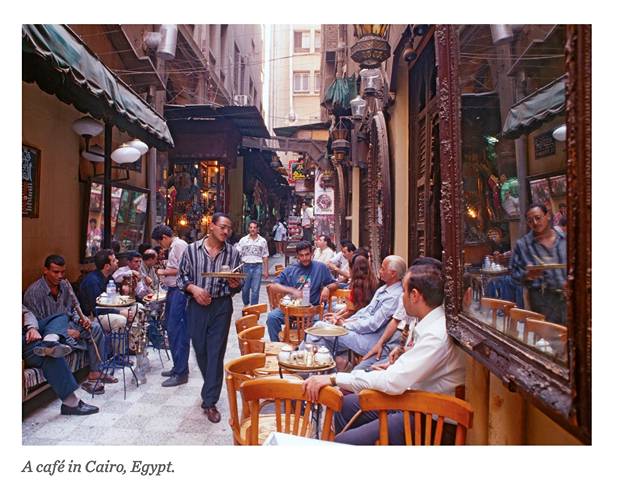This article delves into the exquisite world of Egyptian coffee, a cherished beverage with a distinctive blend that plays a significant role in the Egyptian society.
Let’s walk through the enchanting coffee culture in Egypt and the unique flavors of Egyptian style of coffee, a traditional brew that continues to captivate coffee lovers across the globe.
What Makes Egyptian Coffee Different?
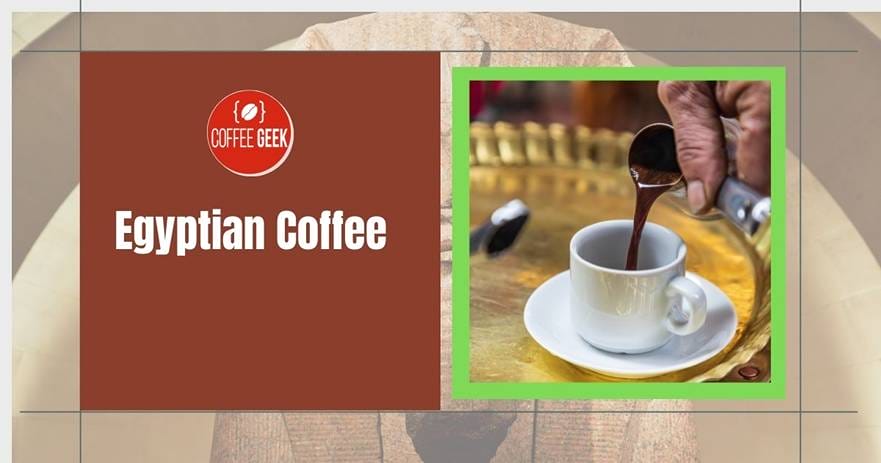
Egyptian coffee is known for its unique brewing methods that produce a rich, deep, and intensely flavored beverage.
Just taking a sip transports you into an aromatic realm, an experience unlike other coffee cultures around the world.
Let’s go on a delightful journey to understand what setting Egyptian coffee apart.
Comparing Egyptian Coffee to Turkish Coffee
People in Egypt, similar to their Turkish neighbors, savor their coffee black and strong. However, the brewing technique and the use of spices like cardamom differentiate the two.
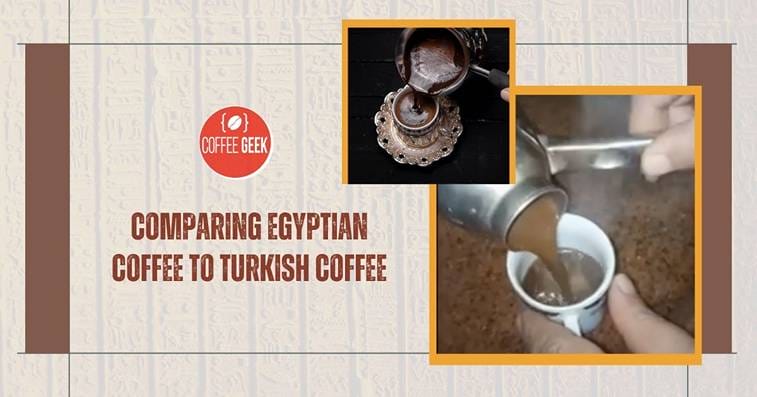
The perfect Turkish coffee is made in a pot called ‘cezve’ and has a frothy layer on top. In contrast, Egyptian coffee, otherwise known as ‘ahwa’, is commonly more concentrated and does not have the froth.
Understanding the Coffee Culture in Egypt
Egypt coffee is more than just a casual morning sip. It is an integral part of the day-to-day life and carries strong cultural significance.
From social gatherings in traditional coffee houses to family dinners, the aromas and flavors of an Egyptian coffee cup hold a special place in the Egyptians’ hearts.
Identifying the Unique Flavors of Egyptian Coffee
The unique tastes of Egyptian coffee are mainly derived from the type of beans and roasting technique followed.
The flavors are further enhanced by the inclusion of spices, creating a beverage that is uniquely Arab and yet universally comforting.
How to Brew the Egyptian Style of Coffee?
An Overview of the Brewing Methods and Tools
To brew Egyptian coffee, you need a coffee pot called ‘kanaka’, beans, preferably Arabic, which you grind to a fine powder, water, and if desired, cardamom.
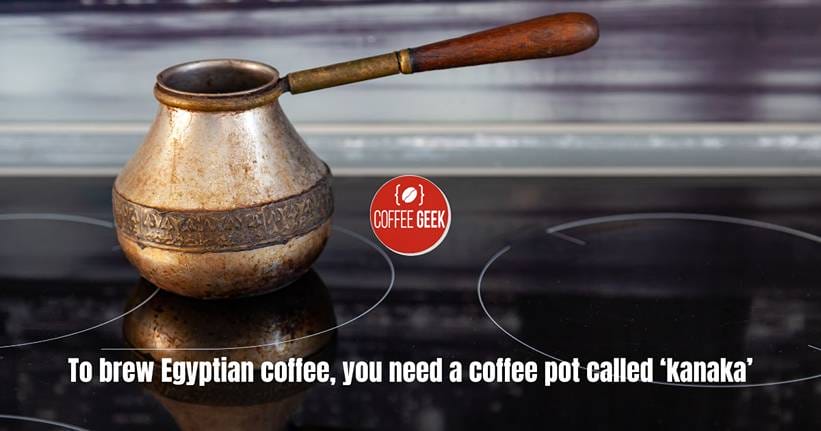
Unlike espresso, Egyptian coffee beans are steeped, not pressurized, resulting in a completely different profile of coffee flavors.
Adding Spices Like Cardamom to the Brew
Spices are indispensable to Egyptian coffee. Adding cardamom not only enhances the aroma but also gives it a spicy kick that is characteristic of the traditional taste.
The Egyptians love using this spice but also experiment with other spices to create their favorite brew.
Origins of Egyptian Coffee
The History and Origins of Coffee in Egypt
While coffee is believed to have been discovered in Ethiopia, its love affair with the people in Egypt began much later as coffee spread through Yemen and the Arabian Peninsula.
The influence of Sufi monks contributed greatly to coffee’s rise in popularity in Egypt.
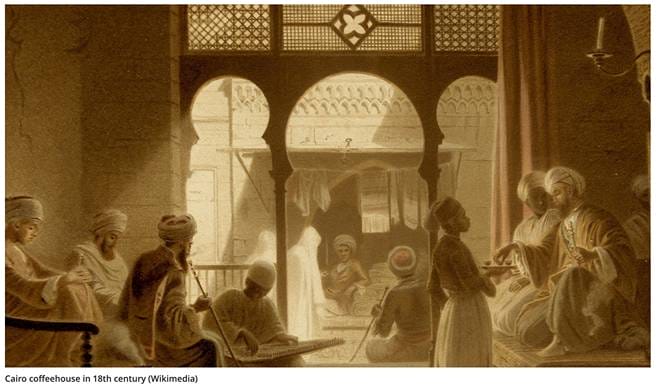
From Ethiopia and Yemen to the Arabian Peninsula
The journey of coffee from the Ethiopian highlands, through Yemen, and into the Arabian peninsula is a tale steeped in history.
It was in Yemen that coffee was first roasted, and the beans were brewed, laying the foundation for the flavors we know and love today.
The Influence of the Sufi on Egyptian Coffee
The Sufi, the mystic sect of Islam, played an instrumental part in spreading the love for coffee, using it as a ritualistic brew to stay awake during their religious ceremonies.
This culture of coffee later infiltrated into everyday Egyptian life due to its social and spiritual connotations, embedding it deeply into Egyptian society.
| Aspect | Description |
|---|---|
| Name | Egyptian Coffee |
| Type | Strong and thick |
| Ingredients | Finely ground Arabic coffee beans, water, sugar (optional) |
| Brewing Method | Brewed in a special pot called “cezve” or “kanaka” |
| Grind Size | Very fine |
| Roast Level | Dark roast |
| Flavor Profile | Intense, rich, and often with a hint of cardamom or other spices |
| Serving Style | Small cups known as “fincan” or “tasse à café” |
| Tradition | Coffee is often associated with social gatherings and hospitality |
| Serving Ritual | Served with small treats like dates or sweets |
| Common Occasions | Celebrations, family gatherings, welcoming guests |
| Cultural Significance | Symbolizes hospitality and warmth; an integral part of social interactions |
| Etiquette | Drinking coffee is a leisurely and social activity |
Understanding the Coffee Beans Used in Egyptian Coffee
Egyptians often use a blend of Brazilian and Ethiopian beans, ground to a fine powder for their coffee. The resulting coffee remains unique, offering different experiences in every cup you pour.
Experience the Egyptian Coffee Culture in Cairo
From savoring a lingering cup of coffee in bustling Cairo streets to observing the slow, methodical process of coffee preparation in local homes, Cairo provides an enriching insight into Egyptian coffee culture.
The fascinating practice of adding coffee and sugar or milk to your coffee is interesting, evoking a familiar comfort in the heart of every coffee enthusiast.
To Wrap It Up
The Egyptian style of coffee, tracing back to its historical roots in the 15th century, is a unique and beloved beverage that has become a mainstay in the country’s culture.
The tradition of preparing Egypt coffee is quite distinctive and is deeply embedded in the nation’s history, with influences from the Ottoman Empire and neighboring regions like Yemen.
Egyptian coffee, known locally as “Sada,” is traditionally brewed in a manner that is quite different from the modern pod-based or black coffee methods popular in many Western countries.
The process of making this caffeinated drink starts with roasting the beans.
Unlike the dark roast often found in other regions, Egyptian beans are typically roasted to a much finer degree, resulting in a fine grind that is crucial for the unique taste and texture of the coffee.
The actual brewing is made by boiling, a method reminiscent of ancient times, perhaps even dating back to the era of the Pharaohs.
This method involves boiling finely ground coffee directly in water, often in a special pot known as a “cezve” or “ibrik.”
This traditional Egyptian method creates a coffee that is quite strong and concentrated, often thicker than the black coffee commonly found elsewhere.
Egyptian coffee, with its rich history along the Nile, offers a unique taste experience that differs from the more widespread methods of preparing coffee, such as using a coffee pod.
The caffeinated beverage is not just a drink in Egypt but a part of the cultural fabric, often enjoyed in social settings and bearing a rich heritage from the Ottoman Empire and Yemeni influences.
In summary, Egyptian coffee represents a centuries-old tradition of coffee preparation, with its fine grind and boiling method creating a distinct flavor profile.
This style of coffee, deeply rooted in the nation’s history and culture, stands out from other global coffee practices, offering a taste of Egypt’s rich past and its enduring love for this caffeinated beverage.
FAQ
What type of beans are typically used for a cup of Egyptian coffee?
The most commonly used beans are the arabica type. They are often finely ground to achieve the distinct flavor and aroma found in Egyptian coffee.
How is the ground coffee prepared in a cezve for an Egyptian-style coffee?
The finely ground coffee is placed in a small pot called a cezve, along with sugar and water.
Then the cezve is placed on a burner to allow the coffee to come to a boil, a key part of the brewing process.
How does the history of coffee in Egypt influence the modern-day way it is made?
Coffee has a long history in Egypt dating back centuries. It made its way from the East Africa region around the 1500s and soon spread throughout Egypt.
Through the years, the Egyptians developed a unique way of roasting and grinding the beans, creating what we now know as the traditional Egyptian style of coffee.
Is there any significant difference between a cup of Egyptian coffee and Turkish-style coffee?
Both are quite similar, given that the coffee comes finely ground and is often brewed in a cezve.
However, Egyptian coffee is one of the best cups of coffee you can have due to its unique taste and aroma that’s full-bodied and robust.
Can I add milk or cream to my Egyptian coffee?
Traditional Egyptian coffee, known as Ahwa, is typically served black.
However, it’s not unheard of to add milk or cream if you prefer a milder flavor. Just ensure you’re looking for a cafe that serves it that way, or prepare it at home to your taste.
How do the different flavors come about in Egyptian-style coffee?
The different flavors come from the type and quality of beans used, and the roasting and grinding process.
A coarse grind will give a lighter taste, while a very finely ground coffee will provide a strong, full-bodied flavor.
What’s the best way to serve a cup of Egyptian coffee?
Typically, Egyptian coffee is served in a small glass along with a glass of water. The water is to cleanse the palate to better enjoy the rich flavors of the coffee.
Is a special type of kettle or saucepan used in the brewing process?
Yes, a small pot called a cezve is traditionally used to prepare Egyptian coffee. The cezve, also known as an ibrik or briki, ensures the coffee comes to a good boil for the best taste.
What role do cafes play in the Egyptian coffee culture?
Coffeehouses, or ahwas, began to spring up across Egypt as the popularity of coffee grew. In these social hubs, people chat, read, and enjoy Ahwa while watching the world go by.
They have become part of the Egyptian lifestyle and tradition.
Are any rituals associated with drinking Egyptian coffee?
Sedna, a special type of coffee, is served at funerals, indicating the importance of coffee in Egyptian customs.
Additionally, preparing a good cup of Egyptian coffee requires care and attention as it reflects hospitality and respect for guests.


